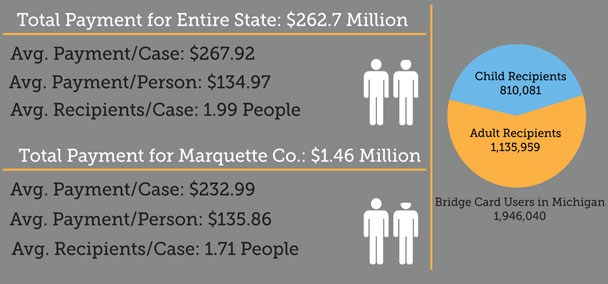Tens of thousands of college students may no longer be eligible for benefits from the Bridge Card program after a shift in qualifications this spring.
The changes in eligibility for the Bridge Card program, a Michigan-specific manifestation of the federal Supplemental Nutritional Assistance Program (SNAP), also known as food stamps, will take effect on April 1, 2011. Michigan college students were previously able to receive an approximately $200 monthly allowance on a Bridge Card, which could be used for purchasing groceries. The new requirements will limit those benefits to college students in certain circumstances.
“(They) must be caring for children, physically or mentally unfit for employment, participating in an on-the-job training program, or working 20 hours a week,” said Christina Fecher, a spokesperson for the Michigan Department of Human Services (DHS). “Attending college by itself is not an approved exception, and our department will enforce that policy starting in April.”
As of January 2011, there are 1,946,040 people in Michigan who receive some sort of aid from food assistance programs like the Bridge Card program, according to the DHS. Fecher said the DHS estimates that approximately 18,000 to 20,000 Michigan college students currently use the program.
“(The DHS) is ready to extend a helping hand to any citizen who is truly in need, including college students who … are taking the right steps toward becoming self-sufficient,” she said.
Bob Genetski, a member of Michigan’s House of Representatives, said that he thinks the new requirements are important because it will help decrease the number of people utilizing the program and help lower federal expenditures.
“This is federal money … and we’re blowing it on welfare. We need to make sure that it is going to those who really need it,” he said. “If we don’t get a handle on these entitlements, the future generations will have to foot a lot of crazy bills for things we didn’t address.”
Genetski said that as a legislator, he often heard complaints from constituents who felt that a lot of the college students using the Bridge Cards in stores didn’t seem to need the extra help.
“A lot of taxpayers don’t mind helping people who are truly in need but they were infuriated to see that their tax dollars were going to a situation that wasn’t needy,” he said. “A lot of people who are really mad about it are those who worked part-time or full-time jobs to get through college. They feel as if the current generation doesn’t understand that work ethic.”
Genetski said there are some additional changes that he would like to see implemented in the Bridge Card program, such as incorporating picture IDs on the cards themselves, which he says would decrease cases of fraud. Genetski said that he was
contacted by the concerned owner of a store in his district, who showed him that some Bridge Card recipients were committing fraud.
“They buy pop and pour it out in the parking lot to get the money from returnables to buy alcohol,” he said. “It’s not what that system is in place for.”
Amber Baillargeon, a senior English writing major at NMU, said that in the year that she has had a Bridge Card, she has not heard of anyone misusing the benefits.
“Everyone that I know that has a Bridge Card has it for very good reasons,” she said. “I haven’t heard of anyone abusing it by letting other people use it or anything.”
Baillargeon said that the Bridge Card allows her to eat healthier because she can afford to create well-balanced meals.
“Before the Bridge Card, grocery buying was sporadic and I absolutely only bought the necessities and even then, sometimes I would go without eggs or milk for weeks because I couldn’t afford everything at once,” she said.
Baillargeon is canceling her Bridge Card this April when she graduates and, while she won’t be personally affected by the new requirements, she said that she thought the change should be gradual.
“I understand why they’re making the changes that they’re making, but at the same time a lot of college students will be set back financially by this,” she said. “I don’t know what they can do to change it, but maybe they could have done it in smaller increments over the course of a year, and not so drastically with everyone at the same time.”





























